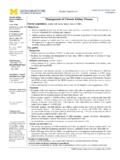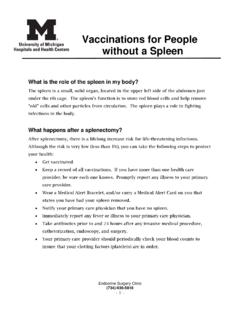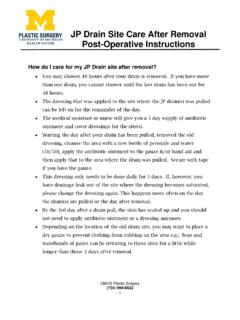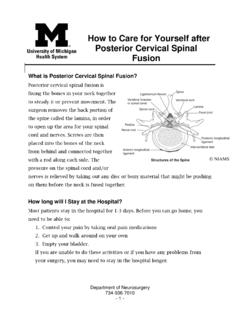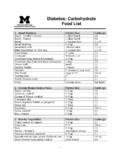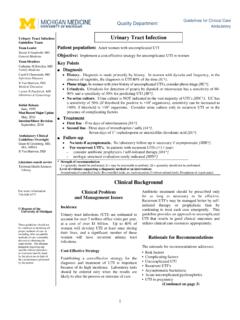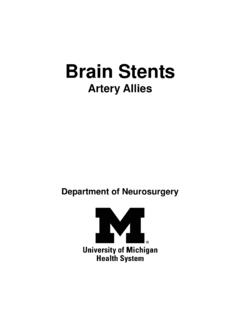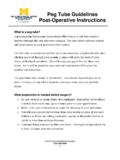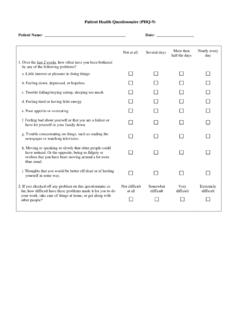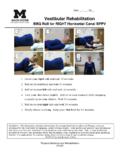Transcription of Non-Starchy Vegetables/Protein/Fat
1 Non-Starchy Vegetables/Protein/Fat Non-Starchy vegetables Nutrition Facts One serving: cup cooked vegetables or 1 cup raw vegetables Calories: 25. Total Fat: 0g Total Carbohydrates: 5g (dietary fiber 1-4g). protein : 2g Alfalfa sprouts Mixed vegetables, no corn Artichoke or peas Artichoke hearts Mushrooms Asparagus Okra Beans: Italian, green, yellow, wax Onions Bean sprouts Parsley Broccoli Peppers, all varieties Brussels sprouts Radishes Cabbage Rhubarb, fresh Carrots Rutabaga Cauliflower Sauerkraut Celery Snow peas or pea pods Chicory Spinach Chinese cabbage Summer squash Cucumber Swiss chard Eggplant Tomato, raw Green onions or scallions Tomato paste Greens: beet, collard, dandelion, kale, Turnips mustard, turnip vegetable juice cocktail Jicama Water chestnuts Kohlrabi Watercress Leeks Zucchini Lettuce.
2 Endive, escarole, leaf, Romaine, iceberg Comprehensive Diabetes Center -1- protein Nutrition Facts: One ounce contains 7 grams of protein and very little or no carbohydrate. An average serving size is 3 ounces, which is about the size of a deck of cards. Choose very lean or lean meats more often. Very Lean Meats (0-1 gram fat/ounce) Medium Fat Meats (4-7 gram fat/ounce). Chicken or turkey, white meat, Beef, most cuts, trimmed of fat no skin Cheese, reduced fat (5g fat/oz.). Cottage cheese, reduced fat Chicken or turkey, dark meat Cheese, fat-free with skin Egg substitute Egg Fish Ground turkey Shellfish Pork (top loin, chop, cutlets).
3 Tofu Lean Meats (2-3 gram fat/ounce) High Fat Meats (8-9 gram fat/ounce). Chicken or turkey, dark meat, no Bologna skin Salami Cheese, low-fat (1-3g fat/oz.) Cheese, regular Cottage cheese, regular Hot dogs Ham Spareribs Lean beef (round, flank, sirloin) Sausage, bratwurst Lean pork (loin, tenderloin) Peanut butter Comprehensive Diabetes Center Diabetes: Non-Carbohydrate foods -2- Fats Nutrition Facts: Heart-healthy fats are lower in saturated fat and cholesterol compared to less healthy fats. Keep in mind that portion size can make the difference between a healthy fat and a not so healthy fat. Serving sizes below contain 50-120 calories and 4-8 grams of fat per serving and no carbohydrate.
4 Heart Healthy Fats Less Healthy Fats Tub margarine made with Bacon: 1 slice olive or canola oil: Butter: 1 Tablespoon 1 Tablespoon Stick margarine: 1 Tablespoon Nuts: 1 Tablespoon Cream: 1 Tablespoon Oil (olive, vegetable ): Cream cheese: 1 Tablespoon 1 Tablespoon Cream cheese (light) : 2 Tablespoons Salad dressing Gravy: 2 Tablespoons (vinaigrette/oil) Salad dressing (Ranch) : 1 Tablespoon 2 Tablespoons Sour cream: 2 Tablespoons Peanut butter: 1 Tablespoon Avocado: 1/8 avocado Disclaimer: This document contains information and/or instructional materials developed by the University of Michigan Health System (UMHS) for the typical patient with your condition.
5 It may include links to online content that was not created by UMHS and for which UMHS does not assume responsibility. It does not replace medical advice from your health care provider because your experience may differ from that of the typical patient. Talk to your health care provider if you have any questions about this document, your condition or your treatment plan. Patient Education by University of Michigan Health System is licensed under a Creative Commons Attribution-NonCommercial-ShareAlike Unported License University of Michigan Diabetes Education Program (734) 998-2475. Last Revised 11/13/2015. Comprehensive Diabetes Center Diabetes: Non-Carbohydrate foods -3.
